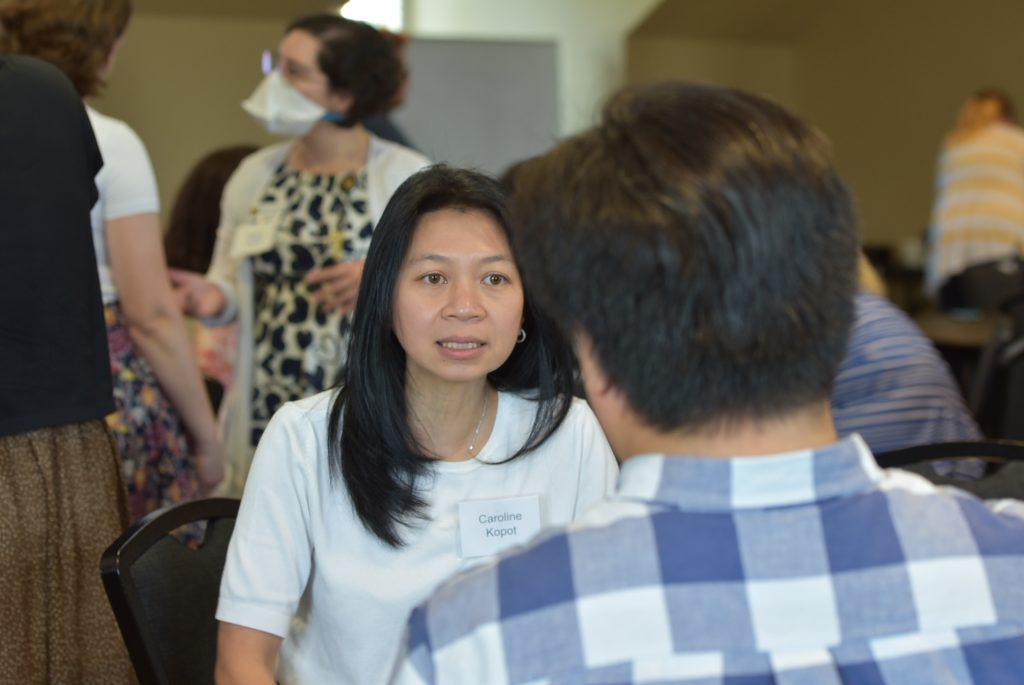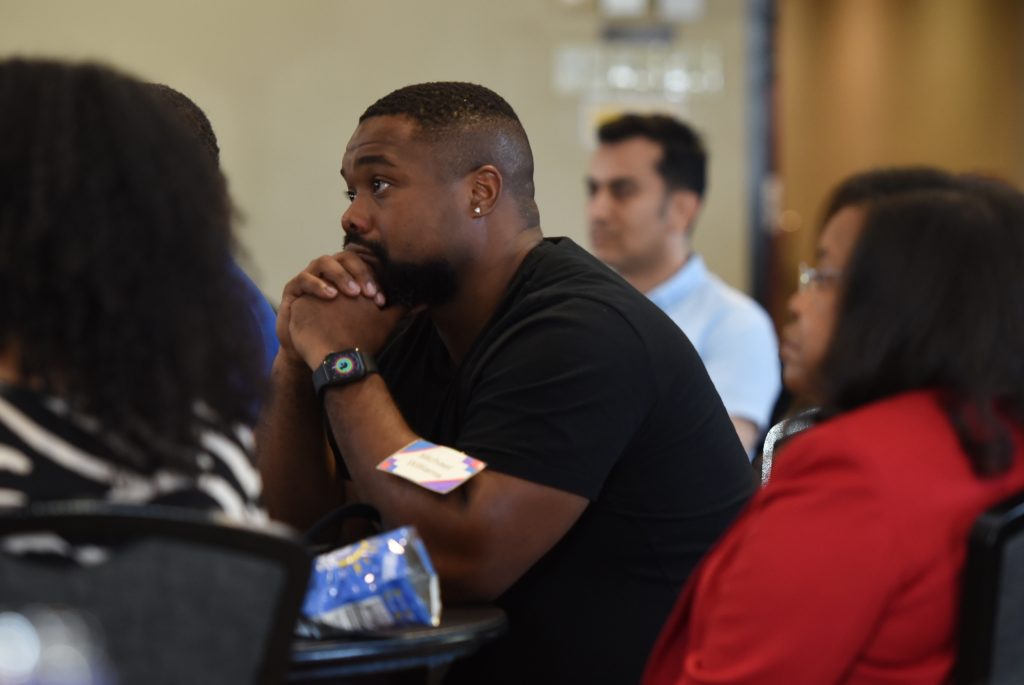Published on Nov. 28, 2023
A Supportive Community for Faculty at Mizzou

by Jade Elwess
Caroline Kopot joined the Department of Textile and Apparel Management (TAM) in fall 2020 as an assistant professor during the pandemic. She moved to Missouri from Georgia and had no family or friends here. Everyone was still meeting on Zoom, so she wasn’t even seeing her colleagues in person.
Later that fall, she learned about a professional development and support group for faculty that she decided to join, because she liked its mission of bringing diverse faculty together. That group, originally called The Huddle, was then meeting on Zoom, and eventually started meeting in person. The group was later reformed in 2022 as Connection, a joint effort between the Office of the Provost and the Division of Inclusion, Diversity and Equity.
Connection gave Kopot the community that she needed as a new person in a new town, especially during the pandemic. She would recommend the group to other faculty, whether or not they are new to Mizzou.
“My insight to new faculty is that you need a community that can support you. In my case, Connection was the community that I needed to start my journey at Mizzou,” Kopot says, “In general, we are social people. In academia, where you need collaborators, you need connections, and that connection comes from your community.”
Connection is facilitated by Maurice Gipson, vice chancellor of Inclusion, Diversity and Equity, and Candace Kuby, associate provost for faculty success.
“What makes Connection so powerful is that it was created in direct response to feedback that IDE and the Provost’s Office received from junior faculty members about ways to assist in their development and growth,” says Gipson, “By focusing on issues that matter most to them, we have created a community of support and encouragement for junior faculty members to thrive as evidenced by their increased collaborations and productivity.”
In addition to the support from the group meetings, another outcome from Connection was a cross-disciplinary research project. Early on in the group, Kopot met Michael Williams, assistant professor in the Department of Educational Leadership & Policy Analysis in the College of Education & Human Development, who has been at Mizzou since 2017.
According to Williams, as soon as he and Kopot met, they immediately thought about opportunities to work together. Collaborating with a colleague from TAM wasn’t that far-fetched to him, since he thought of his research in equity and diversity, teaching and learning, and interpersonal relationships as cross-disciplinary.
“What Connection did explicitly is give me the opportunity to share my expertise with a broader community so that we could see those points of connection across our research programs and then support each other,” he said.
Kopot and some colleagues from TAM were starting to write a grant application to the USDA and they needed an evaluator for the educational modules on their team. She reached out to Williams and he was on board. With his background in education evaluation, Williams seemed like a natural fit as an evaluator.
They were awarded the grant called “Enhancing Students’ Digital Data Literacy: Development and Evaluation of Educational Modules.” The project is to build an open-source data set that can be used by anyone in the textile and apparel management field who is teaching a class in retail merchandizing or digital merchandizing. It will allow them to access data such as pricing, product descriptions, or fabric from e-commerce sites. They are nearly done with the data collection and hope to turn it into an article and apply for a larger grant in spring 2024.

Now that Kopot and Williams are more “senior” members of Connection, they have both taken on leadership roles as a way to give back to other faculty colleagues.
Through the group, Kopot met faculty from other departments and eventually took over leading a weekly writing group. This group is an opportunity for faculty to drop in and be able to focus on their writing and seek advice from others. It is beneficial for her to have the accountability that the group provides. It also facilitates the switch from teaching mode to focusing on writing a grant application.
“I just volunteered myself to be the person in charge because I know I needed it,” she says. “And if I need it, there are most likely other people that need it as well”
The writing group was a way for her to start giving back to others who are in the same position she was in when she arrived at Mizzou. She has also made friendships through the group and they socialize outside of work. It has given her a sense of belonging within the Mizzou community.
Williams is organizing a research, teaching and service showcase to “expose the larger Mizzou community to the talent we have within the group.”
Both are giving back because of seeing the value in the mentorship within the group and sharing what they have learned with newer junior faculty. For example, Williams found out about the National Center for Faculty Development & Diversity (NCFDD) Faculty Success program, formerly called Faculty Bootcamp, due to Connection. He calls it one of the best experiences he’s had and would definitely recommend it to other faculty.
“Caroline and Michael’s collaboration and leadership are testament to how faculty success programs, like Connection, provide spaces for colleagues across the university to meet, discuss common interests, and find ways of partnering as scholars,” says Kuby. “Over time, these faculty members become the leaders and mentors for newer colleagues.”
Taking on these extra projects is a time commitment, but Williams says there are a lot of different ways to participate in Connection. You can come to the monthly large group meetings, attend writing retreats as your schedule allows, or you can join subcommittees.
“Take advantage of the group in a way that serves you and at minimum you are going to be able to connect with other people that want to see you be successful,” he says.
Connection also helps prepare faculty for the promotion and tenure process. Williams is eligible this year and feels more prepared. “I know I can collaborate with somebody in Connection and not only am I helping them get a grant, which helps them with their work, but I’m on a grant that makes my CV look more robust, and I’m more ready for tenure and promotion than I otherwise would be,” he said.
Although Williams takes pride in amplifying the work of other faculty and works as a team scholar, he also has been working on a book for a couple of years that he hopes will be published in December. He is co-editor of Creating New Possibilities for the Future of HBCUs: From Research to Praxis, a book that explores an idea that originated from his time as a doctoral student. He has also been serving as a faculty fellow for the Division of Inclusion, Diversity and Equity since 2022.
“Michael and Caroline have both committed and invested time into faculty success programs and in turn we all, as an MU community, benefit from their presence and expertise,” Kuby said.
Learn more about Connection on the Provost’s website or on the President’s blog. Tenure track and non-tenure-track faculty are welcome to the group, which is geared mainly toward assistant and early associate-level professors.